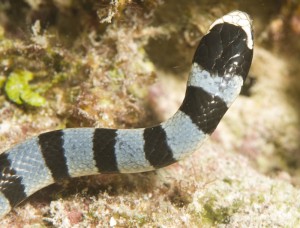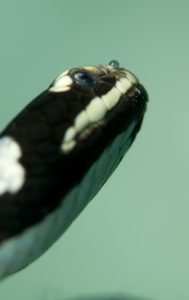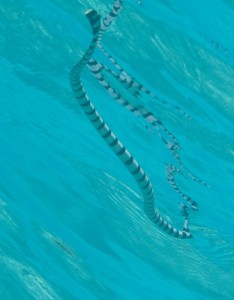Marine Life of Phuket – Banded Sea Snakes
Banded Sea Snakes are found in the tropical waters of the Indo-Pacific region. The Latin name is Laticauda Colubrina and belongs to the Laticaudinae family. Snakes within this family are able to survive on land and in water.
The snakes frequent shallow water as they must surface to breath air. This curious snake with it’s placid nature is recognised by it’s black bands that run the full length of the light blue body. On the underside there may be cream or yellow colouration. The amount of bands vary between 20 and 65. The tail is laterally compressed, thus acting as an oar helping to propel themselves through water. The snake has valvular nostrils with valve like flaps, which close upon submersion. Snakes do not have gills, but they have a left lung that runs almost the entire length of the body. The eyes are protected not by eye lids, but modified scales. The face is highlighted with yellow on the snout, upper lips and bar above the eyes.
Typically, the female is larger than the male. Lengths may vary from 75cm to 200cm. The maximum recorded length of a Banded Sea Snake is 360cm!! This reptile has ventral plates which helps it to move on land. They are oviparous, which means that they return to the land to lay their eggs. The males of the species have two penises, but only one is used when mating. This is known as hemipenes. Once the eggs hatch the young make their way to the sea. Sea snakes move in the water relatively slowly, which means that they are unable to chase fish. The juevenile snakes rely on sand smelts and sand perches for food. As they develop they switch their diet to damsel fish and surgeon fish in addition to crabs, cuttlefish, eels, fish eggs and squid.
Banded Sea Snakes are often seen hunting in crevices. The fixed front fangs are very small and are designed to immobilise prey. This highly venomous marine reptile releases a neurotoxin, which affects the nervous system. The snakes produce 10-15mg of venom. A fatal dose is as low as 1-5mg, that is ten times more lethal than a rattle snake and black mamba. It is possible for a decapitated snake to produce a life threatening bite, so fishermen should be aware!!!!
This is an inquisitive creature that can be mistaken for an eel. The snake, with it’s passive nature is compelling viewing as it hunts amongst the crevices and cracks on the reef. Watching them hunt and ascending to breath can be a diver’s delight.
Why not sign up for a Underwater Naturalist Specialty Course, to learn more about the identification of species to enhance your knowledge and highlight the key things to look for or a go look for yourself on board MV Scuba Adventure or MV Scuba Fun.








Scubacat Community